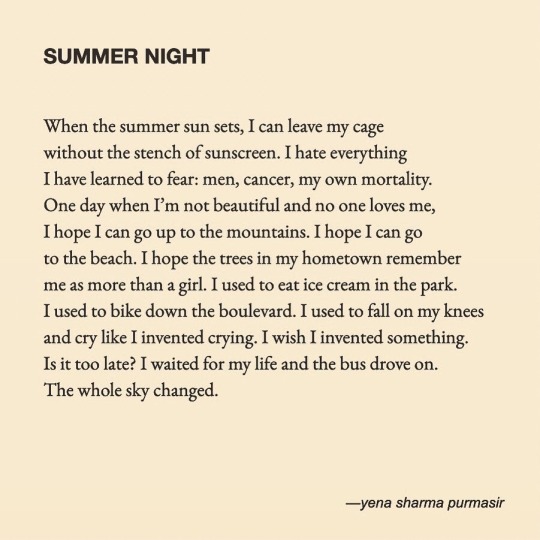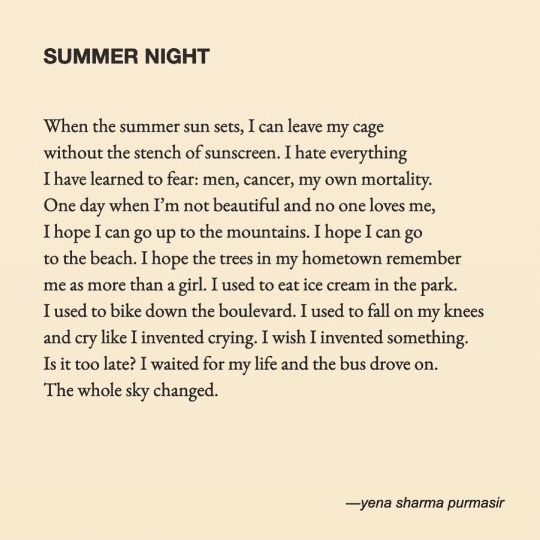#yena sharma purmasir
Text
my poetry new book, VIRAHA, released today!
VIRAHA is a collection birthed out of a space of enduring loneliness, a celebration for the hope of life, that never stays dead for long. These poems repurpose and invent mythologies, situating human fragility and resilience as part of the natural world: every broken heart, lost love, failed dream is as ordinary and bewildering as the sunrise, as a bird in the sky. This is a book about the hard work of continuing.

i wrote the bulk of this book during the first year of the pandemic. it’s the book i’ve always wanted to write and i’m so proud of these poems, that feel so much like my true writer’s voice.
get your copy of VIRAHA here today!
and i’m actually doing a virtual reading TONIGHT (december 13th) at 7:30pm EST with the incredible Lyd Havens (aka @heartmagician) and i would love to see you there—you can check out the event details here!
#poetry#personal#writing#books#poetry readings#poetry books#game over books#lyd havens#yena sharma purmasir#hope#loneliness#pandemic#2022#2022 books#life lessons#time#growing up
5 notes
·
View notes
Note
are there any poems u could recite from memory?
yes there are! ❣️ off the top of my head, i can recite first fig by edna st. vincent millay, wet evening in april by patrick kavanagh, wild geese by mary oliver, won’t you celebrate with me by lucille clifton, summer night by yena sharma purmasir, this be the verse by philip larkin, rain by raymond carver, and asami writes to korra for three years by natalie wee, which is the longest poem i can recite, which i chose as my first ever favorite poem about five years ago, and which still makes me feel as though i’ve lit a small lantern inside my heart to this day
#i can rattle off stanzas and lines from many many many other poems that have stuck with me too but i think these are the only ones i can#recite in their entirety!#asks
53 notes
·
View notes
Text
Dirge
Across the world, people are dying.
Across the country, across the street.
Someone my age. Someone with
my mother's name, my father's face.
Everyday there are more people
asking what to do with the dead,
their bodies, yes, but also their things.
Where do we put their old clothes,
books, awful CD collections? Museums
don't want that garbage. But we can't
just throw it away. What about the hole
in the ozone layer? What about the fish
in the sea? Everything is wrong and there
are people you will never get to meet.
You could have loved them. You could
have borrowed all their favourite things.
— Yena Sharma Purmasir
1 note
·
View note
Text
"Alternate Methods of Dating"
Think their name so often it becomes a feeling. Punctuate your stream of consciousness texts with links to covers of "Don't Stop Believin'. " Tell your best friend you're "in love" and tell your mom "it's not serious." Confess you rewatch their stories via DM, but leave out the winking emoji.
Stop using emojis altogether. Draw a picture of your smiling face that is all teeth and send it to their work email. It doesn't matter how they respond, just that each notification forever rewires your old desktop heart.
Make plans that aren't even plans.
Talk about countries like seasons and seasons like time isn't everything.
Kiss them goodbye with all the passion and grief reserved for someone you might never see again. When you see them again, say their name like it's nothing.
Yena Sharma Purmasir
0 notes
Quote
& you will keep writing anyway.
the mermaid’s voice returns in this one; Amanda Lovelace
#the mermaid's voice returns in this one#amanda lovelace#healing#writing#pretty purple text#women are some kind of magic#lang leav#ladybookmad#caitlyn siehl#clementine von radics#trista mateer#gretchen gomez#noor shirazie#jenna clare#ky robinson#yena sharma purmasir#morgan nikola-wren#mckayla robbin#sophia elaine hanson#orion carloto#nikita grill
54 notes
·
View notes
Photo

On Being the Support Beam in My Family’s House: Holding the World Throughout Loss by Yena Sharma Purmasir
Here is a memory: I come home from school and the apartment is dark. My father’s wheelchair is empty, facing his bed. He is on the floor. His forehead is bleeding. I am six years old. I help him up, which involves putting my arms around him and repeatedly saying that he is okay, that everything is okay. My father is strong. I know this because there is no way I have the strength to lift him back into his wheelchair. But he does. I am just a beam supporting the house.
I get a damp paper towel and wipe his forehead. He is quiet, his whole body slumped down. I call my mom at work, tell her that I got home from school and Daddy fell down but he’s okay and I helped him and I only have spelling homework tonight, so I’m going to go watch some TV now.
As a young child, I was incredibly close to my father. I loved spending time with him, especially when it was just the two of us. Those few hours after school — when my mom was at work and my brother was at daycare — brought me tremendous joy. My father would watch Sailor Moon with me, a plate of cookies between us. He would show me how to use the computer. I would tell him about my day.
Those were on the good days. On the bad days, my father would be at the hospital, sometimes for weeks on end. I would think about him all day at school. I would imagine his loneliness, his dislike of hospital food, and his total loss of control. On those afternoons, I would go to a friend’s house, do my homework, and wait for my mother to pick me up.
The day my father was in the car accident, I was at a friend’s house, eating healthy after-school snacks and fiddling with his Sega game console. When my mother came to get me, she was crying — a vulnerability I had never seen from her before.
I was terrified on the way to the hospital for that first time. I was five years old — everything I knew about hospitals and accidents and broken bodies came from glimpses of TV dramas, the kind of shows I should have been too young to watch. But my father was fine. Or, he wasn’t fine — his body was a series of breaks, wrapped in plaster, stitched up and swollen. He looked hurt, but he also seemed happy. He joked with us. He made me laugh. My father could always make me laugh.
I saw him cry exactly once, in the middle of the night. He was talking to my mom -- it was a tender moment between the two of them. I remember climbing onto his lap, and I told him to be brave. He wiped his face and hugged me.
According to my mother, I’ve always had a pleasant disposition. Apparently, as a toddler, I only had a tantrum once. After seeing a friend of mine fling herself on the floor, kicking and screaming, tears running down her face, I thought about adopting her dramatic insistence for myself. It worked for her. It did not work for me. I never tried again.
I was a happy child, quiet but friendly. I never broke down in school, I didn’t sulk, I wasn’t envious of other children. There was no reason to be angry — life was complicated, but it was also good.
Every week, my family would share a Cadbury chocolate bar, rationing four square pieces. I remember this tradition as the sweetest, purest thing. In the evenings, I would rub my father’s back. My little hands worked on his knots — he seemed to bend like the letter C, all curvature. I used to rub lotion on his leg, paying special attention to the bolts of his metal brace embedded in his skin.
A few years later, that leg would be amputated. When we saw him after that surgery, my father asked us what kind of animal his stump looked like. I thought a dog. My little brother thought maybe a pony.
A few months later, he had an operation that involved removing skin from his chest to take out his decade old pacemaker, completely irrelevant to the plethora of issues that came from the accident, but even more serious. It was one of the more invasive surgeries that he endured. The scar was huge, the size of a steak, with the pink and white layers exposed. My mom couldn’t bear to look at it. Neither could my father’s sister.
I was seven years old. I said I could do it. One of our neighbors, a lovely nurse, came to check on my father daily. I was her assistant, changing his dressing and cleaning the wound. He winced through the whole process. Once, he tried to tell me that I had already cleaned it. It started off as a joke, but then he became irritable. He wheeled himself away from me. I had to coax him to sit still, to let me peel off the medical tape and gauze. It hurt him, the wound, and maybe the fact that I was the one looking at it.
The day my father died was the second time I saw my mother cry. In the days and weeks and months that followed that moment, when the strongest force of nature in my life suddenly lost steam, everything changed. The kids in my class had written sympathy cards to me and my brother, and every single one of them insisted that I had to take care of my mother, because she needed me, and because she could die too.
I don’t remember the exact point in time when I became so close to my mother. Just that one day, she was the person who knew me best, the voice on the phone when I came home, the body on the sofa as I watched Seinfeld reruns, a bag of jalapeño chips sitting between us. And I worried about her just as I had worried about my father, imagining her developing loneliness and unfurling nightmare. While my mother never asked me to rub her back and I never found her crumpled on our living room floor, I still felt that same overwhelming responsibility.
It’s wonderful to be needed, to be given a sense of purpose. In the adult world, where young people so often become background noise, and living metaphors for innocence void of personhood, I was given the space and agency to participate in my family tragedy. I had a role and a function. But, in taking care of my father, and later my mother, I also gave up the ability to be more than caring — to be anything else but happy.
The truth is, after my father died, I was furious and sad and scared. My entire world had shifted, as though the roof caved in. I was eight years old — it should’ve been okay for me to feel those things. Someone should have seen that storm growing inside me and asked me to let it out. But no one did, and I locked a lot of those thoughts away. In fact, writing was the only space that allowed me total freedom of expression, serving as powerful medium in my life. But it has limits. Creative autobiographical content is still treated as content, still seen as separate from reality. When I first started writing, teachers thought I was innovative and resilient, not lonely or unhappy.
Here is another memory: I break my arm and it hurts. It’s a hairline fracture, so on a scale of pain, it’s not the worst. I have no reference point because this is my first big injury. But I’m afraid to talk about how it aches, how it itches in the cast. My father recognizes this. He tells me that my pain is real. And that it’s okay to say that it hurts. That it doesn’t make him feel bad. My arm is broken and it’s supposed to hurt. Just because he has more broken bones than I do, it doesn’t change the fact that my arm is broken. He tells me this. When he’s done, I say, Daddy, my arm hurts.
Loss is complicated. Sometimes, I mourn my father’s life because there is so much he didn’t get to do. Towards the end of his life, he talked about going back home to South Africa. But he couldn’t travel, not in his precarious condition. He never saw his children graduate from elementary school or high school or college. He never got to celebrate his 20 year wedding anniversary. I mourn these never’s from his perspective, because he once had a perspective — because he was a person with hopes and dreams and goals, so many of which were never realized.
But sometimes, I mourn the loss of these things from the other perspective — from mine, from my brother’s, from my mother’s. There are things we each lost, parts of our lives that will always be incomplete. For the three of us, some of these things are the same. We all lost the simplicity of splitting a Cadbury bar four ways. But some of our pains are more specific, and they go unshared. My mother lost her life partner. I lost my favorite grown-up.
If pain and suffering are essential parts of life, then love and care help us endure. Loving my parents has changed me, has made me stronger. Maybe I did lift up my father that day, I don't know. My mother has changed, too. In the years of my father’s absence, she has begun to take life less seriously. Now, her laughter inspires my laughter.
We’ve adopted parts of my father — his strengths and weaknesses, his easy sense of humor, his overpowering obstinance. We give up these roles and then reclaim them as our own. Not all is lost. Some part of our old family, our old time, is still here. Some part of us survived.
35 notes
·
View notes
Quote
Okay, baby, if it makes you feel better,
you can imagine
your worst case scenario.
You can imagine a monster
but that doesn’t make it
real.
Yena Sharma Purmasir from ‘Dream Deferred’ from her book When I am Not There
(This book honestly is very quickly becoming everything I ever wanted in my father. He isn’t dead. He is very much alive and in good health and comes home every night but he doesn’t rly feel like my father. I am SO thankful Yena wrote this book. I didn’t know I needed it until I had it.)
#yena sharma purmasir#poetry#quotes#dream deferred#when i am not there#poetry book rec#book recs#fav#out of my collection
195 notes
·
View notes
Text
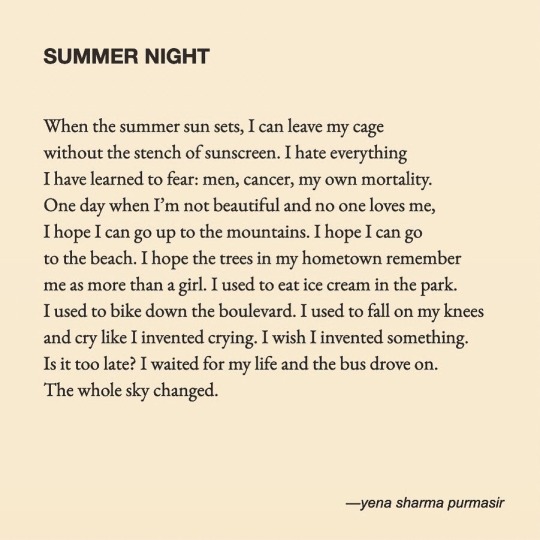
yena sharma purmasir
4K notes
·
View notes
Photo


my new book, Our Synonyms: An Epic comes out tomorrow!
to celebrate, Party Trick Press is hosting an EPIC lil virtual book launch party! join us at 8pm EDT on wednesday, july 20th for religious retellings and feminine rage
tickets are free, but you have to register to attend! i hope you’ll be there, i owe so much of my writing life to you all
#poetry#personal#poetry books#party trick press#2022 books#mythology retellings#religion#feminism#hinduism#buddhism#christianity#yena sharma purmasir#our synonyms: an epic#2022#new books#mythology#life lessons#poetry readings
2 notes
·
View notes
Text
Book Review: [Dis]connected Poems & Stories of Connection and Otherwise - Amanda Lovelace; Nikita Gill; Iain S. Thomas; Cyrus Parker; Sara Bond; Yena Sharma Purmasir; Trista Mateer; Canisia Lubrin; R. H. Swaney; Pierre Alex Jeanty
Are you ready for your new favourite collection? This might just be my favourite of the year so far. #Disconnected #BookReview
Wow, wow, wow this is an incredible connection. Going in I expected more poetry than short stories but in the end, I thought these were some of the best short stories I have ever read. There was a real sense of variety despite the connection they all share and the collection itself.
This is a collection that tackles so many different issues from grief to family. Real life issues to fantastic…
View On WordPress
#Amanda Lovelace#Book#book review#Canisia Lubrin#Cyrus Parker#Iain S. Thomas#Nikita Gill#Pierre Alex Jeanty#poetry#R.H. Swaney#Sara Bond#short story#Trista Mateer#Yena Sharma Purmasir
0 notes
Note
do you have any favourite poems lately? i just went thru your poem recommendations list from a while ago and your taste is impeccable! 🌟
oh, thank u so much! 💝 here are some poems i’ve been enjoying these days :-)
afterlife by franny choi
summer night by yena sharma purmasir
imaginary paintings by lisel mueller
on hierophany by karen an-hwei lee
mujh se pehli si mohabbat by faiz ahmed faiz (as interpreted by humera channa and nabeel shaukat)
bird by dorianne laux
poem with no children in it by claire wahmanholm
rain by raymond carver
my sister, who died young, takes up the task by jon pineda
elemental by joanna klink
tea by leila chatti
a song on the end of the world by czeslaw milosz
#i’m sorry this list is so short... i’ve been so busy w/ school lately i haven’t had time 2 read for fun 😞#asks#uploads
165 notes
·
View notes
Photo
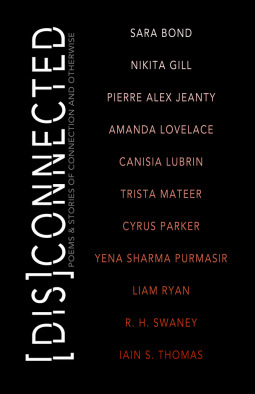
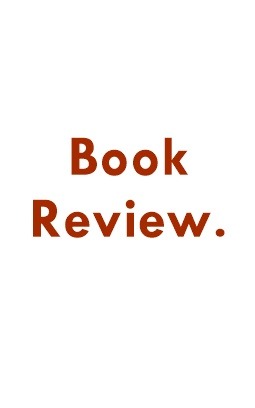
Review: Disconnected by Amanda Lovelace; Nikita Gill; Iain S. Thomas; Cyrus Parker; Sara Bond; Yena Sharma Purmasir; Trista Mateer; Canisia Lubrin; R. H. Swaney; Pierre Alex Jeanty.
A collection of short stories and poetry, Disconnected is a book that features an incredible collection of poetic talent from the likes of Amanda Lovelace and Nikita Gill.
The stories are really something in this book, sometimes hard hitting, sometimes beautiful, in particular Cyrus Parker’s and Amanda Lovelace’s stories really strike me in this book, (Spoiler: in fact, give me a whole freakin’ novel of Amanda Lovelace’s short story I’m here for polyamorous selkies).
In between these stories are poems that just space these stories out perfectly. Nikita Gill and R.H.Swaney’s contributions in particular are excellent and really add to the connections of these stories. The variety of contributors in this book is immense but they all work flawlessly together to create something truly great with this book, bringing emotion and flowing poetry to the fore.
A book that blooms as it goes, if you need a short story collection, get this one.

(I received an ARC from Netgalley for honest review).
#Disconnected#Amanda Lovelace#Cyrus Parker#RH Swaney#Nikita Gill#Books#Booklr#Book Review#Book Reviews#Stories#Short Stories#poet#poetry#fiction#review#reviews
8 notes
·
View notes
Text
Lyd’s fav poems of 2017
I love making end-of-the-year lists, and here’s (predictably) my favorite end-of-the-year list to make: my favorite poems that were published/performed in 2017 (in no particular order).
Calling a Wolf a Wolf (Inpatient) by Kaveh Akbar
The Police Are Dispatched For A House Fire by Sara Mae
Churching by Kristin Chang
Bourne Identity by Taylor Steele
Good Movies by Tyler Brewington
Femmes by Zenaida Peterson and Angelica Maria
Personal Statement by Joshua Jennifer Espinoza
Allafter: Small Things by John Quiñonez
Written to be Yelled at Trump Tower During a Vigil for the NEA by sam sax
Performance After the End of the World by Talin Tahajian
I Guess By Now I Thought I’d Be Done With Shame by Franny Choi
A HATE POEM. FOR POSEIDON, GOD OF THE OCEAN by Dorothy McGinnis
How Best to Say Body by Talicha Johnson
BBHMM by Tiana Clark
AKA Ladies Night by Melissa Lozada-Oliva
Spiders by Troy Cunio
Love Letter While Bipolar by John Pinkham
Against Consolidation by George Abraham
Mealtime by Topaz Winters
I’m Sorry my OCD is Not a Love Poem by Harper Russet
Kelis - Milkshake by Hanif Abdurraqib
Carrie Buck and I Compare Surgery Scars by Linette Reeman
Is Rejoice by Tara Hardy
THE WAY I CARRY IT by Yena Sharma Purmasir
Aubade, I Guess by Ewan Hill
**I’m forgetful as hell and read/heard a lot of poems I absolutely adored this year, so I’ll probably be adding onto this list until New Year’s!!!
#words#poems#best of 2017#writing#ok to reblog#i heard some of these poems live#and some of these were written by my friends#what a blessed year#also if you go through this list at all: tell me your favs!! either from this list or from your own <3 <3
86 notes
·
View notes
